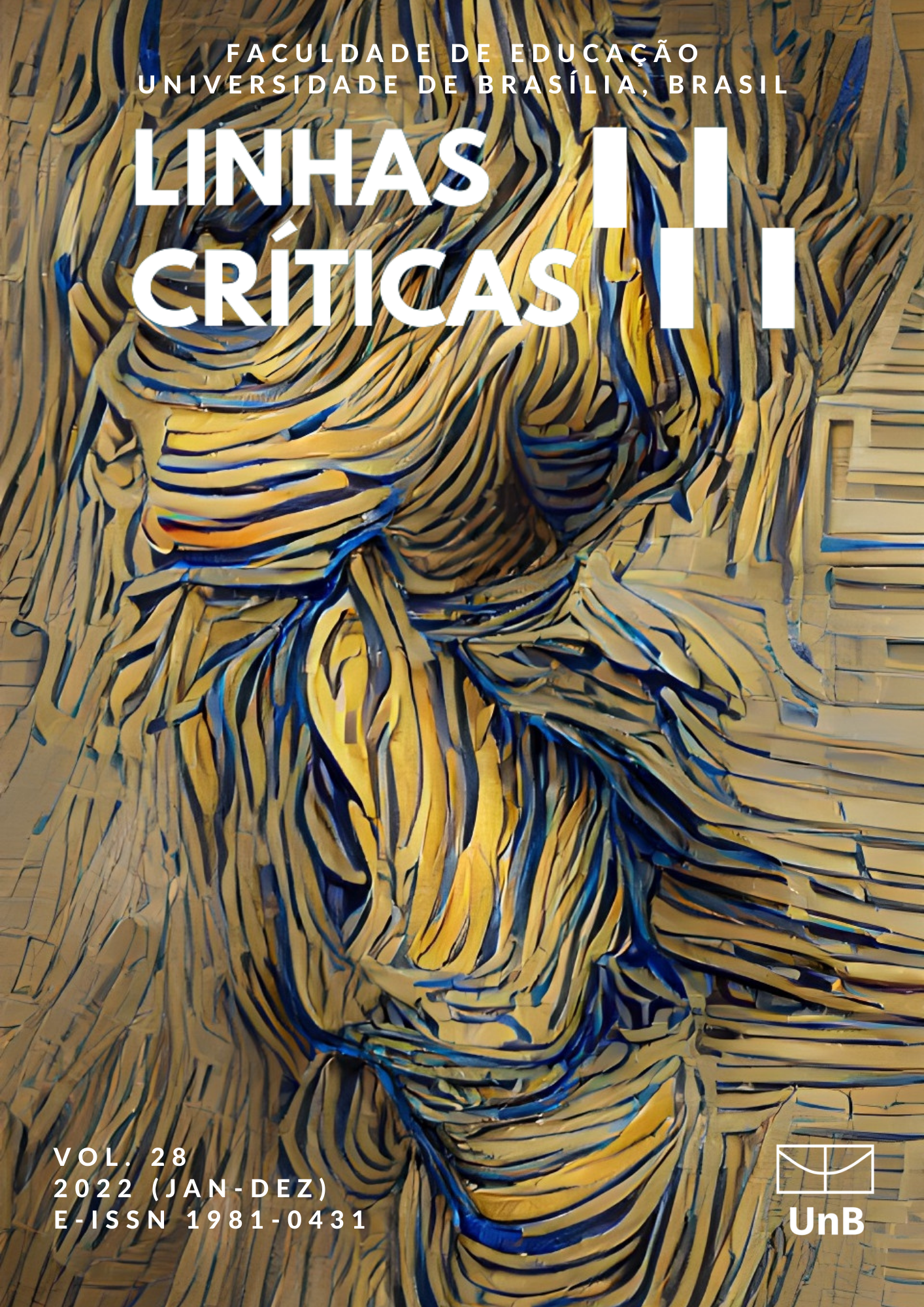Epistemology of practice in the field of education: challenges, possibilities and perspectives
DOI:
https://doi.org/10.26512/lc28202241650Keywords:
Epistemology, Practice, Professionalization, Teaching, Epistemology of PracticeAbstract
This study aimed to analyze some of the potentialities, limitations, challenges and perspectives related to the concept of epistemology of practice in the educational field. We sought, through a theoretical essay, to substantiate the understanding of practice in the social sciences in general and the representations linked to the concept of epistemology of practice, traversing part of its origins, criticisms and current perspectives. It is concluded that it is necessary to encourage the development of research on the concept of epistemology of practice, whose analytical paradigm has potential to contribute to the development of pedagogical practice and the production of knowledge in the educational field.
Downloads
References
Alves, W. F. (2007). A formação de professores e as teorias do saber docente: contextos, dúvidas e desafios. Educação e Pesquisa, 33(2), 263-280. https://doi.org/10.1590/S1517-97022007000200006
Beckett, D., & Hager, P. (2000). Making judgments as the basis for workplace learning: towards an epistemology of practice. International Journal of Lifelong Education, 19(4), 300-311. https://doi.org/10.1080/02601370050110365
Cochran-Smith, M., & Lytle, S. L. (1999). Relationships of knowledge and practice: teacher learning in communities. Review of Research in Education, 24(1), 249-305. https://doi.org/10.2307/1167272
Duarte, N. (2003). Conhecimento tácito e conhecimento escolar na formação do professor (por que Donald Schön não entendeu Lúria). Educação & Sociedade, 24(83), 601-625. https://doi.org/10.1590/S0101-73302003000200015
Ferry, N. M. (1998). An inquiry into Schön’s epistemology of practice: exploring links between experience and reflective practic. Adult Education Quarterly, 48(2), 298-112. https://doi.org/10.1177/074171369804800205
Freitas, H. C. L. (2002). Formação de professores no Brasil: 10 anos de embate entre projetos de formação. Educação & Sociedade, 23(80), 137-168. https://doi.org/10.1590/S0101-73302002008000009
Gauthier, C., Martineau, S., Desbiens, J. F., Malo, A., & Simard, D. (2013). Por uma teoria da pedagogia: pesquisas contemporâneas sobre o saber docente. Unijuí.
Japiassu, H. P. (1991). Introdução ao pensamento epistemológico. Francisco Alves.
Kemmis, S., & Wilkinson, M. (2002). A pesquisa-ação participativa e o estudo da prática. Em L. E. Diniz-Pereira, & K. M. Zeichner. A pesquisa na formação e no trabalho docente. Autêntica Editora.
Lira, M. R., & Sarmento, E. C. D. (2016). Professor reflexivo: um contributo à epistemologia da prática e à formação docente. Revista Contrapontos, 16(3), 439-453. http://doi.org/10.14210/contrapontos.v16n3.p439-453
Perrenoud, P. (1997). Práticas pedagógicas, profissão docente e formação: perspectivas sociológicas. Dom Quixote.
Perrenoud, P. (2002). A prática reflexiva no ofício de professor: profissionalização e razão pedagógica. Artmed.
Pimenta, S. G. (2002). Professor reflexivo: construindo uma crítica. Em S. G. Pimenta, & E. Ghedin. Professor reflexivo no Brasil: gênese e crítica de um conceito. Cortez.
Raelin, J. A. (2007). Toward an epistemology of practice. Academy of Management Learning and Education, 6(4), 495-519. https://doi.org/10.5465/amle.2007.27694950
Roldão, M. C. (2007). Função docente: natureza e construção do conhecimento profissional. Revista Brasileira de Educação, 12(34), 94-103. http://doi.org/10.1590/S1413-24782007000100008
Sánchez Gamboa, S. (2014). Epistemologia da prática. Em F. J. González, & P. E. Fensterseifer. Dicionário Crítico de Educação Física. Unijuí.
Schatzki, T. R., Cetina, K. K., & Savigny, E. V. (2001). The practice turn in contemporary theory. Routledge. https://doi.org/10.4324/9780203977453
Schön, D. A. (1983). The reflective practitioner: how professionals think in action. Basic Books.
Schön, D. A. (1987). Educating the reflective practitioner: toward a new design for the teaching and learning in the professions. Jossey-Bass Publishers.
Schön, D. A. (2000). Educando o profissional reflexivo: um novo design para o ensino e a aprendizagem. Artmed.
Shulman, L. S. (1987). Knowledge and teaching: foundations of the new reform. Harvard Educational Review, 57(1). https://doi.org/10.17763/haer.57.1.j463w79r56455411
Tardif, M. (2012). Saberes docentes e formação profissional. Vozes.
Tardif, M., & Lessard, C. (1999). Le travail enseignant au quotidien: contribution à l’étude du travail dans les métiers et les professions d’interactions humaines. Les Presses de l’Université Laval.
Tardif, M., & Moscoso, J. N. (2018). A noção de “profissional reflexivo” na educação: atualidades, usos e limites. Cadernos de Pesquisa, 48(168), 388-411. https://doi.org/10.1590/198053145271
Tardif, M., Lessard, C., & Gauthier, C. (2001). Formação dos professores e contextos sociais. Rés Editora.
Whitehead, J. (2000). How do I improve my practice? Creating and legitimating an epistemology of practice. Reflective practice: International and multidisciplinary perspectives, 1(1), 91-104. https://doi.org/10.1080/713693129
Zeichner, K. M. (1990). Changing directions in the practicum: looking ahead to the 1990s. Journal of Education for Teaching, 16(2), 105-132. https://doi.org/10.1080/0260747900160201
Published
How to Cite
Issue
Section
License
Copyright (c) 2022 Luiz Gustavo Bonatto Rufino, Samuel de Souza Neto

This work is licensed under a Creative Commons Attribution 4.0 International License.
Authors who publish in this journal agree to the following terms:
-Authors maintains the copyright and grants the journal the right of first publication, the work being simultaneously licensed under the Creative Commons Attribution License which allows the sharing of the work with recognition of the authorship of the work and initial publication in this journal.
- Authors are authorized to enter into additional contracts separately, for non-exclusive distribution of the version of the work published in this journal (eg publish in institutional repository or as a book chapter), with acknowledgment of authorship and initial publication in this journal.
-Authorers are allowed and encouraged to publish and distribute their work online (eg in institutional repositories or on their personal page) at any point before or during the editorial process, as this can generate productive changes as well as increase the impact and the citation of published work (See The Effect of Free Access).



